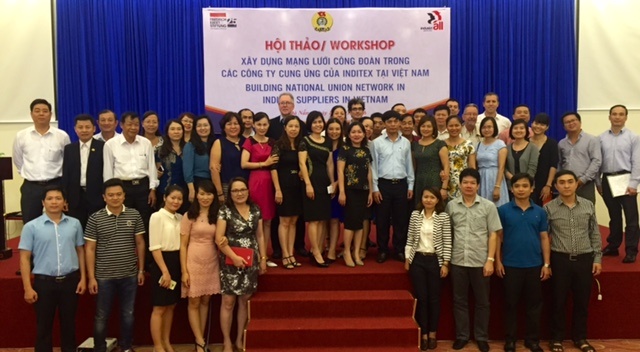14 November, 2016IndustriALL Global Union, with the support of the Friedrich Ebert Stiftung, held a two-day seminar in DaNang with the base unions of Inditex suppliers in Vietnam.
In Vietnam, Inditex has 130 factories covering around 150,000 workers who produce products for seven Inditex brands: Zara, Pull&Bear, Massimo Dutti, Bershka, Lefties, Oysho and Zara Home.
The unions came from the Bac Giang, Hai Duong, Thanh Hoa, DaNang, Ho Chi Minh, Long An, Binh Duong and Dong Nai provinces. The Vietnam General Confederation of Labour (VGCL) and the Vietnam National Union of Textile and Garment Workers participated as well.
Tran Van Ly, vice president of the VGCL, opened the meeting by calling on the local unions to first share and coordinate information and then to develop strategies for collective bargaining on a sectorial level.
“The global framework agreement between IndustriALL and Inditex gives the Vietnamese textile and garment unions a base to collectively organize their work, added Christina Clausen, IndustriALL’s textile and garment industry director.
“This is key to building sound and democratic industrial relations.”
The formation of the network has been in the development since 2015, when IndustriALL held a workshop on organizing in the global supply chain. This meeting developed into the creation of a northern and southern network. These two networks make up the base of the newly launched national Inditex supplier network. Representatives were elected to represent and implement the action plan of the network.
Sister Duyen, who was elected as the southern network representative, said that “at first I felt nervous to have the responsibility but I know that this network will be helpful for our work in Vietnam as it is so important to bring together unions in the sector to work on common issues.”
In the spirit of social dialogue and in building mature industrial relations, Inditex and several of its key suppliers attended the morning session on the 12th of November. The session began with an overview of the Inditex sourcing and sustainability model, both globally and locally.
The network representatives stressed that trade unions need to be active participants in ensuring that the principles enshrined in the global framework agreement are respected in the workplace – workers need to be active in ensuring that their rights are respected.
The network requested Inditex and its supplier factories to support their work to contribute to stable industrial relations. Ms. Ha, a newly elected network representative added that “With this network, we believe that Inditex suppliers’ factories will improve their labour relations and as such, we know that this improvement will be more attractive for Inditex to continue and increase its production in Vietnam.”
Over the two days, participants discussed and analyzed global and national trends in the garment, textile and footwear industries by examining the current situation for collective bargaining, labour productivity, Vietnam’s minimum and living wage, and global brands’ purchasing practices.
Do Quynh Chi, an independent researcher, presented her recent study on the “National situation of textile, garment and shoe industries and supply chain” that highlighted Vietnam’s industrial development and its implications for garment and footwear industries.
ILO National Project Coordinator, Ta Thi Bich Lien, gave an overview of the ILO VGCL multi-employer collective bargaining and lessons learnt from the Hai Phong EZTU and Da Nang FOL project. The pilot programme supports organizing with a bottom-up approach, union capacity building, multi-employer collective bargaining and social dialogue.
Based on these presentations and follow up discussions, the network set several key goals:
- Mobilize workers to increase density
- Harmonize collective bargaining themes to begin to work towards national standards
- Develop training for network base unions for collective bargaining
- Exchange information between local unions.


